
An official website of the United States government
Here’s how you know

Official websites use .gov A .gov website belongs to an official government organization in the United States.
Secure .gov websites use HTTPS A lock ( Lock A locked padlock ) or https:// means you’ve safely connected to the .gov website. Share sensitive information only on official, secure websites.

- For U.S. Citizens/Lawful Permanent Residents

Advance Parole
Due to recent changes to U.S. immigration law, travel outside of the United States may have severe consequences for aliens who are in the process of adjusting their status or applying for an immigrant visa (refugees and asylees). Upon return, these aliens may be found inadmissible, their applications may be denied, or both. It is important that the alien obtain the proper documentation before leaving the United States.
Aliens who have pending applications for certain immigration benefits need Advance Parole to re-enter the U.S. after traveling abroad.
Aliens applying for advance parole on the basis of a pending application for adjustment of status must be approved for advance parole prior to leaving the United States in order to avoid the termination of their pending application for adjustment . Note: this does not apply to aliens who have applied to adjust to permanent resident status and who maintain H-1B (Specialty Worker) or L-1 (Intracompany Transferee) status, or their dependents, who have applied to adjust to permanent resident status and who have valid H-1B or L status and valid visas, V nonimmigrants who have a valid V nonimmigrant visa, are in valid V nonimmigrant status and have or obtain a valid V nonimmigrant visa before applying for readmission to the US, and K-3/4 nonimmigrants who have applied to adjust to permanent resident status and who have a valid K-3/4 nonimmigrant visa, are in valid K-3/4 nonimmigrant status and have or obtain a valid K-3/4 nonimmigrant visa before applying for readmission to the US.
An I-131 application for Advance Parole is filed with U.S. Citizenship and Immigration Services (USCIS) pursuant to the instructions found on their Website.
Aliens in the United States should, prior to departure , obtain Advance Parole in order to re-enter the United States after travel abroad if they have:
- Filed an application for adjustment of status but have not received a decision from the U.S. Citizenship and Immigration Services;
- Hold refugee or asylee status and intend to depart temporarily to apply for a U.S. immigrant visa in Canada; and/or
- An emergent personal or bona fide reason to travel temporarily abroad.
Applicants who are the beneficiary of a Private bill and Applicants who are under deportation proceedings must file to the Department of Homeland Security, 425 I Street, NW, ATTN: Parole and Humanitarian Assistance Branch, Washington, DC 20536. Aliens in the United States are not eligible for Advance Parole if they are:
- In the United States illegally; or
- An exchange alien subject to the foreign residence requirement.
Please note that Advance Parole does not guarantee admission into the United States. Aliens with Advance Parole are still subject to the U.S. Customs and Border Protection inspection process at the port of entry.
For more information, please visit the State Department website or the U.S. Department of Homeland Security website. To apply for a passport, U.S. citizens can visit State Department website or call the U.S. Passport Office at 1-877-4USA-PPT or TDD/TYY: 1-888-874-7793. Foreign residents should contact their respective governments to obtain passports.

- Immigration
Understanding the Risks of Travel with Advance Parole During I-485 Processing
Planning to travel with advance parole during i-485 processing be aware of the potential risks. this article discusses the implications of travel during the immigration application process and highlights the importance of understanding the potential risks involved..

Key Takeaways:
- Advance Parole allows individuals adjusting their immigration status to travel abroad without jeopardizing their pending applications.
- Risks of traveling on Advance Parole include abandonment of the application, delays in returning, and potential policy changes.
- Mitigate these risks by obtaining Advance Parole, staying updated on immigration news, and consulting with an attorney.
Understanding Advance Parole
Advance Parole is a document that allows individuals, who are in the process of adjusting their immigration status to that of a lawful permanent resident, the opportunity to travel abroad and re-enter the United States without jeopardizing their pending applications. It’s particularly relevant for those who have filed or are about to file Form I-485, the application for Adjustment of Status.
The Risks of Traveling on Advance Parole
Those who have chosen to apply for Advance Parole need to be aware of the associated risks, especially when it comes to the I-485 processing time frame. Here’s what you should consider before deciding to travel:
Abandonment of I-485 Application
Traveling without Advance Parole or before the document has been approved may lead to the abandonment of your I-485 application. This is a critical risk to assess because reapplying can be time-consuming and costly.
An Unexpected Delays in Returning to the US
Suppose there’s a sudden change in your personal circumstance or broader political climate, such as a pandemic or visa ban. In that case, re-entry to the US could be delayed, disrupting your presence in the country and impacting your pending application.
Impact of New Immigration Policies
Immigration laws and policies can change rapidly. New policies may affect the validity of your Advance Parole or your ability to return to the United States. It’s essential to stay updated on the latest immigration news and consult with immigration experts when considering travel.
Also of Interest:
How many times can you reschedule an h-1b visa appointment, visa interview dress code for usa in india: guidelines.

Application Denial upon Return
Even with Advance Parole, your re-entry to the US is not guaranteed. Customs and Border Protection officers at the port of entry will reevaluate your eligibility for admission. If there are grounds of inadmissibility found, you may face challenges.
Mitigating the Risks
Taking the following steps can help mitigate the risks associated with travel during the immigration application process:
- Obtain Advance Parole before planning any trips outside the United States.
- Wait for the I-485 receipt notice that confirms your application is being processed.
- Check the expiration date of your Advance Parole and plan to return to the US well before it expires.
- Stay abreast with the latest immigration news and policies.
- Always consult with an immigration attorney if you’re unsure about your travel plans and ensure you’re compliant with all requirements.
When Should You Consider Advance Parole?
Here are some situations where obtaining Advance Parole may be necessary:
- Emergencies that require your presence abroad, such as a family illness or death.
- Important educational, work-related, or professional obligations that can’t be postponed.
Even though Advance Parole exists for these reasons, remember that re-entry to the U.S. is at the discretion of border officials.
Travel during immigration application, particularly when your I-485 is processing, is fraught with risks. It’s crucial to fully understand the implications of traveling with Advance Parole to make informed decisions.
Before you decide to travel, always check the official U.S. Citizenship and Immigration Services (USCIS) website for the most recent information regarding Advance Parole and consult with a legal expert.
Remember, the safest option may often be to remain in the United States until your adjustment of status is complete. This can help you avoid the I-485 processing risks that come with international travel.
And there you have it, my friends! Traveling during the immigration process can be a rollercoaster ride, but with a little Advance Parole knowledge, you’ll be prepared for the twists and turns. Remember to stay updated on the latest immigration policies, consult with experts, and always play it safe. For more tips and tricks on navigating the immigration journey, hop on over to visaverge.com. Happy travels!
FAQ’s to know:
1. What is Advance Parole and its significance in adjusting immigration status?
Advance Parole is a document that allows individuals in the process of adjusting their immigration status to travel abroad and re-enter the United States without jeopardizing their pending applications. It is particularly relevant for those filing Form I-485, the application for Adjustment of Status, and helps prevent the abandonment of the application due to international travel.
2. What are the risks of traveling on Advance Parole during the I-485 processing time frame?
Traveling without Advance Parole or before its approval can lead to the abandonment of your I-485 application, requiring costly and time-consuming reapplication. Additionally, unexpected delays in returning to the US due to personal circumstances, political climate changes, or pandemic-related restrictions can disrupt your presence and impact your pending application.
3. How can the risks associated with traveling on Advance Parole be mitigated?
To mitigate risks, it is crucial to obtain Advance Parole before planning international trips, wait for the I-485 receipt notice confirming processing, and return to the US before the Advance Parole expires. Regularly stay updated on immigration news and policies, consulting immigration attorneys to ensure compliance with requirements and informed decision-making.
What did you learn? Answer below to know:
- True or False: Traveling without an approved Advance Parole document can lead to the abandonment of an individual’s I-485 application.
- What are some risks associated with traveling on Advance Parole? (Choose all that apply) a) Unexpected delays in returning to the US b) Impact of new immigration policies c) Automatic approval of re-entry to the US d) Risk of application denial upon return
- When should you consider obtaining Advance Parole? (Choose the correct answer) a) Only in emergencies b) Only for educational obligations c) Only for work-related commitments d) In situations like emergencies, important obligations, and family or personal matters abroad
Verging Today

New USCIS Rules for H-1B Workers After Layoffs
USCIS issues guidelines for H-1B layoffs impacting immigrant workers at companies like Google and Walmart. Stay informed on visa terminations.
Trending Today
U.s. visa invitation letter guide with sample letters.
Learn how to write an invitation letter for a U.S.…
Top 10 B-1/B-2 Visa Interview Questions with Answers
Prepare for your B-1/B-2 Interview with these 20 sample questions…
H-1B 2025: Will There Be a Second Lottery?
The USCIS announced the completion of the initial H1B 2025…
How to Complete the DS-160 Form Online: A Step-by-Step Guide
Filling out the DS-160 form is a critical step for…
Understanding the B1/B2 Visa 6 Month Rule: Stay Duration Explained for Multiple Entries
Learn about the B1/B2 visa 6 month rule and understand…
Sample Cover Letters for Schengen Visa Application
Applying for a Schengen visa involves various documents, one of…
Thailand Visa-Free Entry for 93 Nations Starting June 2024
Thailand enhances tourism with Travel Simplification: 93 countries now eligible…
Passport Expiration Rules: The 6 Month Validity Requirement | Countries List
Learn about passport expiration rules, including the 6-month validity requirement…
Where to Find US Visa Number on US Visa
Traveling to the United States requires a valid U.S. visa,…
Sample Letters For No Objection Letter for Visa Application
A No Objection Letter (NOC) is often a vital document…
Sign in to your account
Username or Email Address
Remember Me
- Share Content
Advance Parole: Weighing the Benefits and Risks
Themes/Topics: Law & Policy
Geography: California, National
Audience: Undocumented Youth
Choosing to apply for and travel with Advance Parole is a big decision. It’s important to learn as much as you can about the process and consider all the advantages and drawbacks, in order to choose the path that’s right for you. Some people have successfully traveled with Advance Parole without an attorney, but to get low-cost legal advice to help you make your decision, or to help applying, search for a nonprofit immigration law office near you at: ImmigrationLawHelp.org .
Traveling with AP has several benefits and can create new opportunities that might not otherwise be available to you, such as:
- Evaluating what life abroad might be like for you. Jesús’ Story: Testing out life in Mexico https://immigrantsrising.org/wp-content/uploads/AP_Jesus_TestingoutMexico.wav
- Pursuing unique professional or educational opportunities. Iliana’s Story: Pursuing a research opportunity abroad https://immigrantsrising.org/wp-content/uploads/AP_Iliana_ReasonsforTraveling.wav
- Expanding your worldview or changing your perspective. Diana’s Story: Defining freedom https://immigrantsrising.org/wp-content/uploads/AP_Diana_Mydefinitionoffreedom.wav
- Adjusting your status. In some cases, reentering the U.S. with Advance Parole can make future immigration options easier to attain. We recommend talking to an immigration attorney about how Advance Parole travel could potentially affect the adjustment of your status. Estefanía’s Story: Seeking a “lawful entry” back into the U.S. https://immigrantsrising.org/wp-content/uploads/AP_Estefania_ReasonsforApplying.wav
Traveling while undocumented always involves some risk, and Advance Parole is not an exception. Some of the risks include, but are not limited to:
The Customs and Border Protection (CBP) officer at the airport or port of entry has the final say on whether to allow you to re-enter. If possible, talk to a legal representative before you leave to understand all the risks involved. Jesús’ Story: Risks involved in AP travel https://immigrantsrising.org/wp-content/uploads/AP_Jesus_EvaluatingRisks.wav
- Negative interaction with U.S. Customs and Border Protection (CBP) It is likely that when you are returning to the U.S. from your trip, you will be flagged for what’s called “secondary inspection.” That means, you’ll be brought to a separate room to be interviewed by a CBP officer. This experience can be anxiety-inducing and in some cases, traumatic. (For more on what to expect from this process see Topic 4 the “Preparing to Travel with AP” section under our Advance Parole Travel Guide at immigrantsrising.org/AP ). Renata’s Story: Difficult interactions with CBP officers https://immigrantsrising.org/wp-content/uploads/AP_Renata_CBPOfficers.wav
- Overall emotional toll. Traveling outside the country as an undocumented person is very vulnerable and it can have a lasting mental and emotional impact on you. Some emotions that may come up include extreme stress, fear, familial or other relationship tensions, depression, and isolation. As you’re deciding whether or not Advance Parole is right for you, remember that you are not alone and that any and all feelings that may come up for you throughout the process are real and valid.
Reflection Prompts: Considering Advance Parole
Use these prompts as a tool to weigh the benefits and risks of Advance Parole, and to reflect on whether this feels like the right time for you to apply.
- What excites me about the prospect of traveling abroad? What experiences do I want to have? (It’s okay to include fantasies and dreams. Visioning requires bold imagination.)
- What scares me about the prospect of traveling abroad? What fears do I have about traveling with Advance Parole or being in another country? What feels like the worst case scenario to me?
- What is going on in my life right now that is influencing my thinking? What are my priorities, obligations, goals?
- When I think about the possibility of applying for Advance Parole, which impulse is stronger: the one telling me to go? Or the one telling me to stay?
- What parts of the Advance Parole process feel confusing or foreign to me? What do I need to research more in order to feel as informed as possible?
- Who can I talk to about making this decision? Who can serve as a source of support for me throughout the process?
This resource is part of the Advance Parole project. To learn more, visit immigrantsrising.org/AP .
Immigrants Rising helps you make decisions based on your potential, not your perceived limits. Visit our website so you can see what’s possible: immigrantsrising.org . For inquiries regarding this resource, please contact us at [email protected] .

Do you attend a California Community College? California Community Colleges students, faculty, and staff can now get their Advance Parole application support and filing fees covered through the Higher Education Legal Services Project.
- (888) 777-9102
- Learning Center

- How It Works
- All Packages & Pricing
- I-90 Application to Replace Permanent Resident Card
- I-129F Petition for Alien Fiancé
- I-130 Petition for Alien Relative
- I-131 Application for Travel Document
- I-485 Adjustment of Status Application
- I-751 Remove Conditions on Residence
- I-765 Application for Employment Authorization
- I-821D DACA Application Package
- I-864 Affidavit of Support
- N-400 Application for Naturalization
- N-565 Application to Replace Citizenship Document
- Citizenship Through Naturalization
- Citizenship Through Parents
- Apply For Citizenship (N-400)
- Apply for Certificate of Citizenship (N-600)
- Replace Citizenship Document (N-565)
- Apply for a Green Card
- Green Card Renewal
- Green Card Replacement
- Renew or Replace Green Card (I-90)
- Remove Conditions on Green Card (I-751)
- Green Card through Adjustment of Status
- Adjustment of Status Application (I-485)
- Affidavit of Support (I-864)
- Employment Authorization (I-765)
- Advance Parole Application (I-131)
- Adjustment of Status Fee
- Family-Based Immigration Explained
- Search the Learning Center
- Request Support
- Find an Immigration Attorney

Home » Blog » Advance Parole Travel with Adjustment of Status
Advance Parole Travel with Adjustment of Status
January 23, 2024 Apply for Green Card Travel Documents
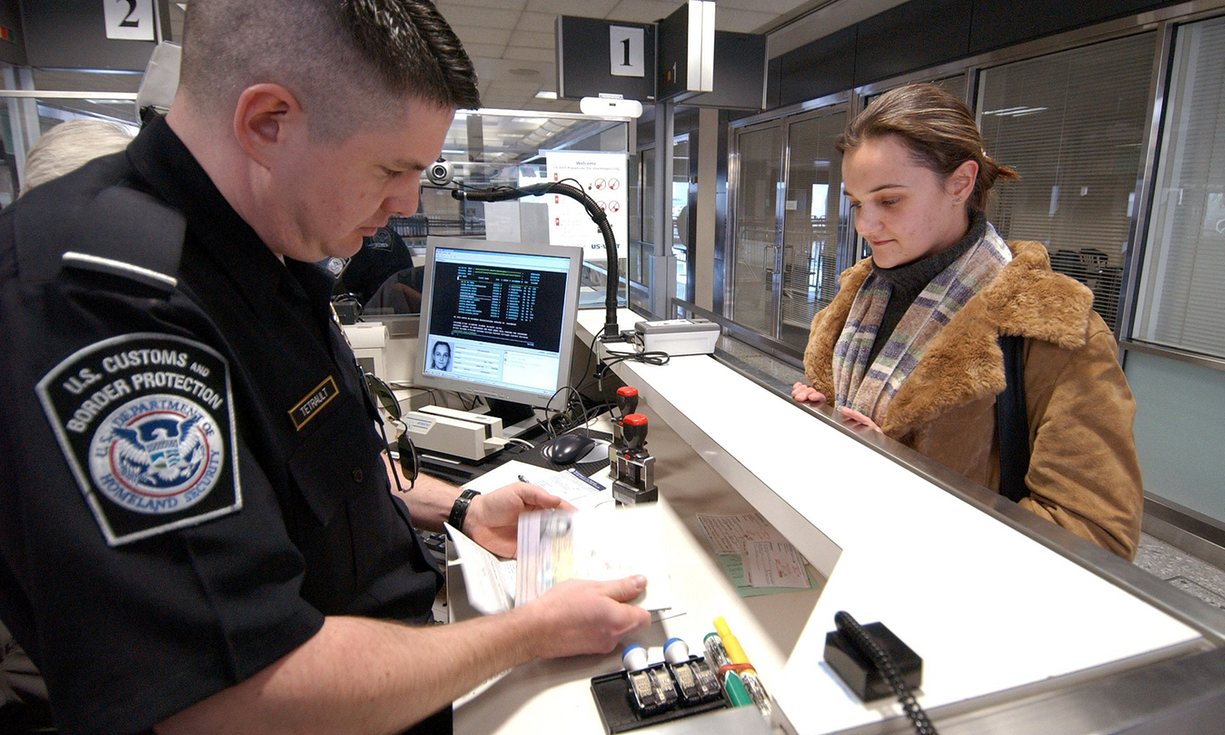
During the adjustment of status process, the applicant remains in the United States while waiting for their green card. But it can take several months to receive status as a permanent resident after filing Form I-485, Application to Adjust Status. Many applicants may want (or need) to travel abroad during this time for the purpose of visiting family, taking a vacation, or even tending to urgent matters. However, leaving without the proper documentation will likely put the beneficiary's adjustment of status application in jeopardy. Generally, an adjustment applicant that leaves the United States without an advance parole travel document will abandon the I-485 application and will have trouble re-entering.
Why is an advance parol travel document so important for I-485 applicants? How do I request advance parole with my adjustment of status case? How much does advance parole cost? What can I do if there is an urgent need to travel abroad? Does advance parole guarantee my re-entry to the U.S.? What else should I know about my advance parole travel document? Does every adjustment of status applicant need advance parole? How can I get help with this process
Why I-485 Applicants Must Obtain Advance Parole Travel Documentation
Non-citizens applying for a green card through adjustment of status generally must be approved for advance parole prior to leaving the United States in order to avoid the termination of their pending application for adjustment. Additionally, advance parole may be necessary to re-enter the U.S.
With a little planning, the adjustment of status applicant can obtain an advance parole document and easily avoid these problems. Advance parole for adjustment of status applicants resolves two issues:
- Allows the adjustment of status applicant to return to the U.S. after travel abroad without obtaining a visa; and
- Preserves a pending adjustment of status application (Form I-485) already filed with USCIS.
Typically, anyone with a pending I-485 that anticipates a need to leave the United States (even for a day) should obtain an advance parole travel document, but there are some exceptions to the requirement.
How to Apply for Advance Parole
Obtaining an advance parole travel document is fairly simple, particularly if you apply at the time of filing Form I-485, Application to Adjust Status.
Advance Parole Application Package
Adjustment of status applicants may use Form I-131, Application for Travel Document , to request Advance Parole. When preparing the advance parole application package, applicants should include all of the following items:
- Prepared and signed Form I-131, Application for Travel Document
- Copy of a government-issued identity document (with photo, name and date of birth) such as an Employment Authorization Card (EAD) or passport
- Two identical passport-style color photographs
- Copy of I-485 receipt notice (Form I-797C, Notice of Action) if I-485 was previously filed and is still pending
You can download the application and filing instructions from the USCIS website . Applicants that want some additional reassurance that their application is prepared correctly can use the CitizenPath. CitizenPath provides simple, step-by-step instructions and even guarantees that USCIS will approve the application. There is no sign up or fee to get started. You pay upon completion. Learn more about the Travel Document Package >
In most cases, there is no interview associated with the Form I-131 application.
When to Submit the I-131 Application
You may submit Form I-131 at any time that I-485 is pending. However, it's typically easiest (and fastest) to file Form I-131 concurrently with Form I-485
You may submit Form I-131 to request an advance parole travel document at the same time you submit your green card application. This is the quickest way to get your application in the queue for processing. If there's any chance you will travel while Form I-485 is pending, we recommend that you submit the application concurrently.
However, you may file Form I-131 at a later date if necessary. You will need the Form I-485 receipt number so that USCIS can link your case. We've found that I-131 applications submitted after the initial I-485 filing take longer to process.

Form I-485 Processing Time
Advance parole for adjustment of status applicants fees.
At the time of writing this article, there is no USCIS filing fee for Form I-131 when applying for an advance parole document based on adjustment of status. Normally, the Form I-131 fee for an advance parole travel document is $575. Specifically, there is no USCIS fee for advance parole if you filed a Form I-485 (adjustment of status application) on/after July 30, 2007, with a fee, and that I-485 application is still pending.
However, USCIS has announced a new fee structure that will change the filing fee for adjustment of status applicants. Once this new fee structure is implemented, I-485 will pay the full fee of $660 when filing Form I-131.
When filing Form I-131 for advance parole with a pending adjustment application, we recommend that you include a cover letter to explain why no fee is included. View a sample cover letter for Advance Parole >
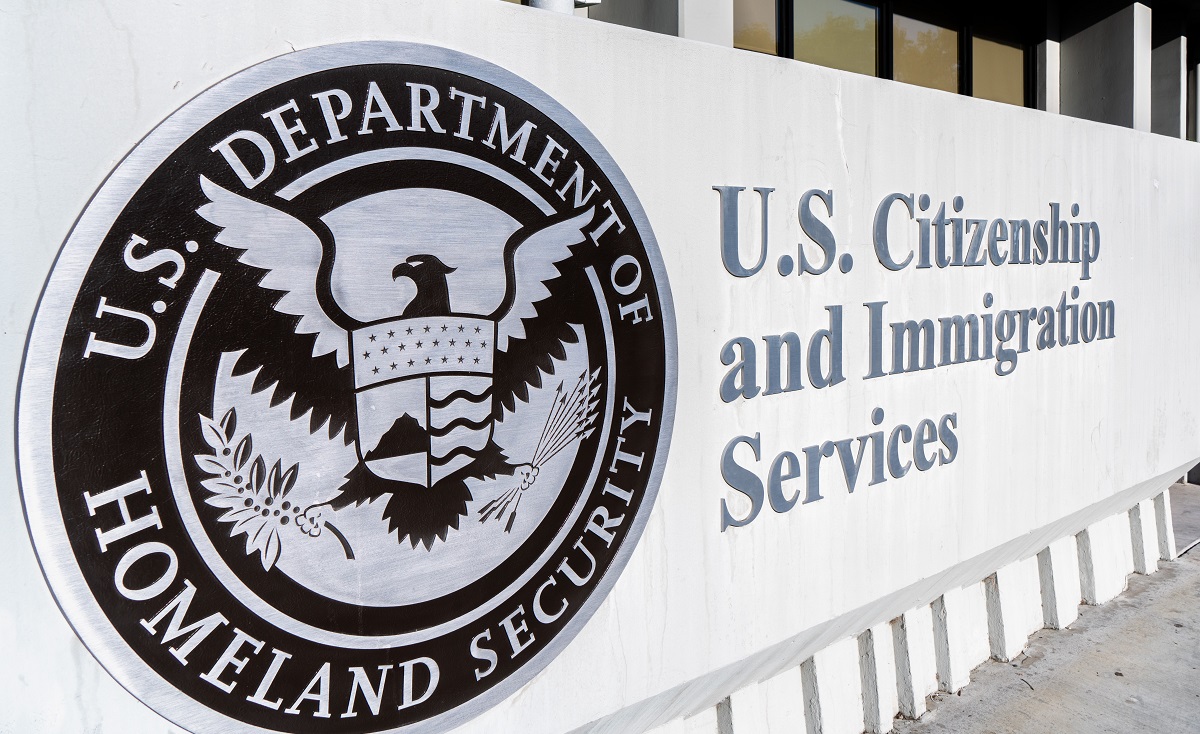
New USCIS Fee Increase Published by Biden Administration
Urgent requests for an advance parole travel document.
USCIS processing times for Form I-131 are currently greater than six months for most cases. This could be a problem if you’re traveling for an extremely urgent situation. USCIS may expedite your case if you have a dire emergency and can evidence the urgent need to travel. USCIS is willing to consider an emergency request for advance parole on a case-by-case basis. You will need to provide evidence to support the emergency request (e.g. medical documentation, death certificate). If you are preparing your Advance Parole application through CitizenPath , we can also provide more detailed directions in your filing instructions.
What You Should Know About Advance Parole
An advance parole travel document is not a guarantee for re-entry to the United States. You are still subject to the standard immigration inspection at a port of entry to determine admissibility into the U.S.
If you have any period of unlawful presence in the U.S., consult with an attorney before filing Form I-131 or traveling abroad. Unlawful presence can include time after unlawfully entering the U.S. or time in the U.S. with an expired visa. If this may apply to you, speak to an experienced immigration attorney before attempting to request advance parole.
Generally, asylees and refugees should not travel to the country you claimed persecution. By returning to that country, your actions suggest that you do not fear persecution. Your application will be denied and could negatively affect your asylum/refugee status in the U.S. In some cases, there are legitimate reasons for returning to the country you claimed persecution. If this applies to you, please speak to an experienced immigration attorney before filing Form I-131.
Traveling with Advance Parole
Known formally as Form I-512L, Authorization for Parole of an Alien into the United States, the advance parole document, is often printed on a standard, letter-size piece of paper. It is generally valid for a period of one year. However, advance parole travel should be limited to a period of less than 90 days.
Applicants that applied for employment authorization concurrently may receive an Employment Authorization Card with “Serves as I-512 Advanced Parole" printed on the front.
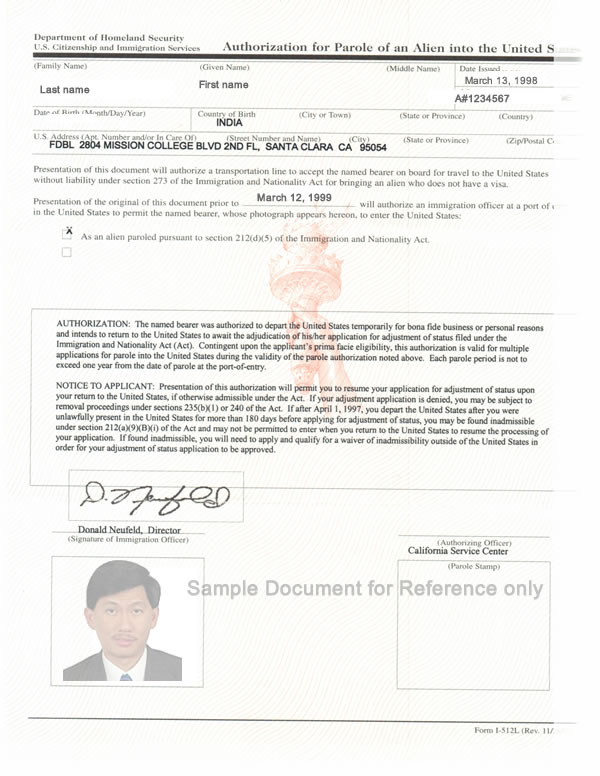
Upon receiving the document from USCIS, review it to confirm all of the information is correct. An advance parole document will also include the last day that it may be used to re-enter the U.S. Be sure that your travel is complete and that you return before this date.
Take the original AP document with you when you leave the United States. You’ll need to present it before getting on a plane, ship, bus, or train headed back to the U.S. and to the Customs and Border Protection officer when you arrive.
When traveling with advance parole as an adjustment of status applicant, remember to:
- Take your original Advance Parole Document
- Take a photocopy of the I-797C Notice of Action confirming that your I-485 application was accepted
- Return before the deadline on your Advance Parole Document – leave extra time in case of travel delays
Exceptions to Advance Parole Requirements
In certain situations, adjustment of status applicants are not required to obtain an advance parole document. If you hold a valid H-1, H-4, K-3, K-4, L-1, L-2, V-2, or V-3 visa or status, you may travel without advance parole approval provided that you maintain your status. For example, you don’t need advance parole if you are traveling for the same employer that sponsored your H or L visa. The H or L status must be valid, and you must have evidence that you filed an adjustment of status application. Carry the Form I-797C Notice of Action that confirms you have filed Form I-485.
However, obtaining advance parole may be a useful strategy even if it isn't "required." For example, an H-1B worker may also have a pending adjustment of status case. If an H-1B renewal is denied while the beneficiary is outside the U.S., they will not be able to re-enter with H-1B status to resume the green card application process. By applying for and receiving an advance parole travel document before departing, that person has a backup strategy to re-enter the U.S. and finish adjustment of status (regardless of H-1B status).
About CitizenPath
CitizenPath provides simple, affordable, step-by-step guidance through USCIS immigration applications. Individuals, attorneys and non-profits use the service on desktop or mobile device to prepare immigration forms accurately, avoiding costly delays. CitizenPath allows users to try the service for free and provides a 100% money-back guarantee that USCIS will approve the application or petition. We provide support for the Adjustment of Status Package (Form I-485) , Travel Document Package (Form I-131) , and several other immigration services .
Want more immigration tips and how-to information for your family?
Sign up for CitizenPath’s FREE immigration newsletter and
on our immigration services
Related Posts

DACA Green Card through Marriage
The Deferred Action for Childhood Arrivals (DACA) program was meant to be a short-term solution when President Obama introduced it in 2012. Since then, it… Continue Reading →

Adjustment of Status Denial Due to Changes in Circumstances
When you’re preparing an adjustment of status application package, it goes without saying that you need to be eligible. However, it’s important to remember that… Continue Reading →

Form I-485 Denial from Bars to Adjustment
Immigration law (INA §245) allows certain foreign nationals who are physically present in the United States to adjust status to permanent resident (green card holder).… Continue Reading →
Immigration Form Guides Form I-90 Form I-129F Form I-130 Form I-131 Form I-131A Form I-134 Form I-485 Form I-751 Form I-765 Form I-821D Form I-864 Form N-400 Form N-565 Form N-600
Sign Up to Receive Free Monthly Information for Your Immigration Journey
© Copyright 2013-2024, CitizenPath, LLC. All rights reserved. CitizenPath is a private company that provides self-directed immigration services at your direction. We are not affiliated with USCIS or any government agency. The information provided in this site is not legal advice, but general information on issues commonly encountered in immigration. CitizenPath is not a law firm and is not a substitute for an attorney or law firm. Your access to and use of this site is subject to additional Terms of Use .


Travel on Advance Parole: FAQs
Applicants for adjustment of status with a pending I-485 application are eligible to receive an Advance Parole travel document, which enables them to travel internationally without the need of an underlying visa while they wait for their green card to be approved. If you have received Advance Parole on the basis of a pending adjustment of status application, you may be considering the following:
Is the Advance Parole supposed to be issued as a combination card with the EAD if I apply for both at the same time?
Historically, if the I-765 and I-131 applications for the EAD and Advance Parole were filed concurrently, USCIS would approve both applications at the same time and issue an EAD/AP “combo card” that could be used for both work authorization and travel. This combo card looks identical to an EAD card, but printed at the bottom of the card is the phrase “SERVES AS I-512 ADVANCE PAROLE.”
However, in the past year, it has been common for USCIS to approve the I-765 application first, and the I-131 several months later, even if the applications were filed simultaneously (this appears to be a response to the pressure to improve EAD processing times). When the 2 applications are approved separately, the EAD card is issued without the “I-512” endorsement printed at the bottom. The Advance Parole, when approved on its own, would be issued in the form of a full-page document called the I-512L, printed on heavy paper (similar to an original I-797 approval notice) with the applicant’s photograph at the bottom. When the applications are approved separately, it is important that the applicant not use the standalone EAD card for international travel – it will not be accepted by CBP without the “SERVES AS I-512” endorsement. Instead, if the full-page original I-512L document should be used as the travel document.
When I enter the U.S. using Advance Parole, my electronic I-94 record lists a one-year validity period. Do I need to extend the I-94 prior to that end-date?
No. Unlike the I-94 for nonimmigrant status, which needs to be extended before the end-date, the I-94 that you are issued when entering on Advance Parole does not need to be extended. The “DA” class of admission indicates that you are an adjustment of status applicant, and you are in a period of authorized stay as long as the I-485 application remains pending. The one-year duration listed on the I-94 is standard, and no action needs to be taken prior to that end-date.
When I enter the U.S. using Advance Parole, what is my status? If I have an unexpired approval notice for nonimmigrant status, such as H-1B or H-4 with EAD, can I be considered in that status and work based on it?
This is a bit of a grey area. As mentioned above, upon entering the United States using your Advance Parole, you are considered an adjustment of status applicant, and your most recent I-94 indicates that. However, USCIS has stated that those who entered the U.S. on Advance Parole can have their valid, unexpired H or L status extended through an extension of status application filed with USCIS. Adjustment of status applicants may therefore reactivate their nonimmigrant status via an extension of status application, without the need of travel out of the U.S. Travel to Mexico or Canada could also be a quick way to reactivate prior nonimmigrant status in the absence of a valid visa stamp, through automatic revalidation . It is recommended to discuss with a business immigration attorney about your work authorization options when returning to the U.S. using Advance Parole, if you cannot or don’t intend to use an adjustment-based EAD.
How can I expedite processing of a pending I-131 application?
The options to expedite a pending application for Advance Parole are unfortunately quite limited. At this time, there is no premium processing option for the I-131 application, and USCIS typically reserves expedited processing requests for extremely urgent or unusual situations. If there is an emergency or humanitarian need for travel, assistance may also be requested from the applicant’s Congressional representative’s office. For long-pending cases, federal court litigation may also be an option.
If I am granted emergency Advance Parole, how long is it valid for?
Advance Parole that is granted in response to an approved expedite request will usually only be valid for the amount of time it takes to attend the emergency situation. Rather than the typical 2-year validity period, an emergency Advance Parole may only be valid for 1 month or several weeks.
If I travel while my I-131 application is pending, will it be denied?
Yes, USCIS policy currently states that departing the U.S. while an Advance Parole application is pending can result in abandonment and denial of the I-131 application. Applicants who travel while their I-131 application is pending therefore must be prepared to return using their nonimmigrant status, including applying for a visa stamp from a U.S. consulate while abroad, if necessary.
Upon returning to the U.S., the I-131 application can be re-filed, even if the first application remains pending and has not yet been denied. A denied I-131 application will not have an adverse effect on the overall adjustment of status application, or the ability to apply for Advance Parole again.
If my pending I-131 was approved while I was outside the U.S., can I use it to return to the U.S.?
No. Despite USCIS’s policy of denying I-131 applications when the applicant departs the U.S., there are a small percentage that are approved while the applicant is outside the United States. If that is the case, USCIS can still later consider the Advance Parole issued in error, and the entry based on it invalid .
What documents do I need to carry when entering the U.S. using Advance Parole?
You should carry the original valid Advance Parole document (either the EAD/AP combo card, or the original I-512L document) and a copy of your I-485 receipt notice, in addition to your passport.
Will my entry at the border take longer if I am using Advance Parole?
There is a possibility that your entry at the border may take slightly longer when presenting the Advance Parole as your entry document. Some CBP officers routinely ask Advance Parole applicants to wait in secondary inspection at the port of entry, so that the basis of the Advance Parole (the pending I-485 application) can be verified. This is standard at some ports of entry and is not cause for alarm. If asked, the traveler should simply state that their Advance Parole is based on their pending I-485 adjustment of status application.
We are committed to assisting our clients with navigating the often lengthy green card process and other challenging immigration matters as an accomplished business immigration law firm in Houston, Texas. Feel free to contact us or set up a consultation to discuss your specific situation related to your travel plans, and how they may affect your pending applications and work authorization.
By : Rebecca Chen

Rebecca Chen is a Partner at Reddy & Neumann . Her representation includes advising clients throughout the non-immigrant and immigrant visa application process, from initial filing, responding to various requests for evidence, and processing at overseas consulates. Her years of experience in the immigration field have made her a knowledgeable resource for complex business immigration matters.
- H-4/H-4 EAD
- Legislation
- Other Non-Immigrant Visas
- Visa Stamping
Newsletter Signup
What is Advance Parole

- Post author: Lluis Law
- Post published: June 28, 2023
- Post category: Immigration
Have you ever wondered what a parole is in immigration terms? In this blog we will see the complete process in 2024 to obtain it. We will also talk about the advance parole and other types, answering many frequent questions on the subject.
In addition to the extensive information in the article, the immigration lawyers at Lluis Law can help you. We have over 40 years of combined experience helping immigrants.
LATINOS WITH OVER 50 YEARS EXPERIENCE
Tell Us Your Case
Table of Contents
What Is An Immigration Parole?
Let’s see what the parole is in terms of immigration since the parole is a temporary stay permit in the US granted for reasons of significant public benefit or humanitarian reasons.
- This permit allows a person who would otherwise be ineligible or inadmissible to enter the US to travel and remain in the US temporarily.
- The INA allows the National Secretary to use this permit for any alien who must be admitted to the US for humanitarian reasons or significant public benefit.
- The person who obtains this parole is not someone formally admitted to the US in the eyes of immigration law.
- Parole is not intended to be used solely to avoid visa processing, waivers of inadmissibility, or regular processing. Nor is it intended to replace established pathways for refugee processing.
For How much time is the Parole Granted?
Normally the temporary stay permit is granted for a period not exceeding one year.
USCIS will specify the period necessary for you to fulfill the purpose of the parole as indicated in Part 3 of Form I-131 .
The parole can end in two moments. Completion will depend on which event, among the following two, occurs first.
- Date on which the term of the permit expires.
- The beneficiary leaves the US

Can I Work With The Temporary Stay Permit?
If you meet the requirements and do not violate the conditions of the parole, USCIS may, at its discretion, grant you a temporary work permit. To do this, you must request it using Form I-765 , Application for Employment Authorization.
Who Can Apply For Parole?
The temporary residence permit can be requested by any person for themselves or on behalf of another person. To do this, you will use Form I-131.
This petitioner can be an individual or entity and does not have to be a US resident or related to the beneficiary. He will file the I-131 petition on behalf of a person who is outside the US or for himself.
Do You Need A Sponsor To Get The Parole?
Yes, USCIS requires evidence of a sponsor providing financial support while in the US.
Note : This is an important factor that USCIS considers when granting temporary stay permission. Failure to provide it greatly increases your chances of being rejected for parole.
Sponsor Requirements
- The sponsor may or may not be the same entity or person as the petitioner.
- You must file a Form I-134 , Affidavit of Support, for each parole petition. With this, you must demonstrate that you have the financial resources to support the beneficiary of the parole while the beneficiary remains in the US.
There is no requirement related to the immigration status of the sponsor. However, if the sponsor is a lawful permanent resident or a citizen, it will be easier to demonstrate financial capacity. It is a relevant factor that will greatly help the beneficiary to obtain parole.
Therefore, it is highly recommended that the petitioner, together with the parole request, include evidence of the permanent residence or citizenship of the sponsor. Among others, it may include the following evidence:
- Permanent resident card.
- Naturalization certificate.
- Sponsor’s passport.
- Birth certificate.
Note : Form I-134 details the type of evidence that is required to demonstrate sufficient economic resources and income. These may include:
- Last tax return.
- Letter from the employer to the sponsor.
- Salary stubs.
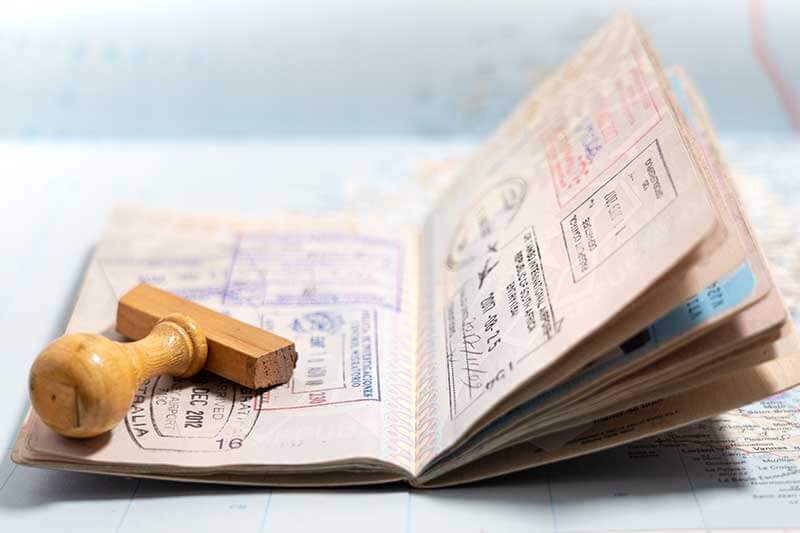
Did they not stamp your passport when you entered the United States ? Find out the reason for this in our recent post.
Having Multiple Sponsors
The petitioner must take into account the Poverty Guidelines of the Department of Health and Human Services , to cover the income and support requirements.
In case one sponsor is not enough, more than one can be identified. It will be done through Form I-134 together with the documents required for each sponsor.

Have An Organization As A Sponsor
Both non-profit organizations and medical institutions can sometimes act as sponsors of the parole.
In the event that the employee of the organization cannot complete Form I-134, a letter of commitment of economic sponsorship from the organization will be included. This will be submitted together with the application for a temporary stay permit (parole).
Be A Self Sponsor
The beneficiary can prove to be financially self-sufficient. You will do this by submitting Form I-134 and supporting financial documentation.
Parole Eligibility
USCIS reviews each case individually looking specifically at the evidence presented by the petitioner. To authorize this permit you must complete the following:
- There are urgent humanitarian or significant public benefit reasons for the beneficiary to be in the US.
- The beneficiary deserves to obtain an exercise of discretion in his favor.
Urgent Humanitarian Causes
Although this term is not regulated nor is there a statutory definition, USCIS considers the circumstances in their entirety. To do this, consider the following factors, among others:
- If the exposed circumstances are or not compelling;
- The effect of such circumstances on the well-being of the person;
- The level of suffering that could be caused by not being authorized for parole (temporary residence permit).
To demonstrate urgency, please review the USCIS guide with the most common types of petitions. Among these, you can request critical medical treatment or visit a terminal relative.
Causes Of Significant Public Benefit
This includes but is not limited to reasons of national security and public order or reasons of national or foreign policy. There is no definition of the term and USCIS will review all circumstances.
Although obviously there is a beneficiary who receives the parole, there really are cases in which it is understood that the benefit is for the general interest.
Both Causes
There are cases in which you can apply for both reasons. An example would be a person who requires an experimental medical treatment that involves future benefit to many other people in the US.
How Does USCIS Determine Who Gets Parole?
You should be clear that USCIS exercises its discretion on a case-by-case basis. That is, they evaluate the positive factors against the negative ones, from the criminal record to humanitarian reasons or significant public benefit.
These are some of the factors that USCIS considers to grant the temporary stay permit:
- That the purpose of the parole can be achieved within a specified period of time.
- Evidence of any matter of national security.
- Evidences of previous fraudulent practices.
- Evidence of criminal history or previous violations of immigration law.
- Intention of the beneficiary to leave the US when his permit expires or if he has the resources to obtain legal immigration status during the parole or in another period that the permit is reissued.
- Consideration of whether the beneficiary’s presence would benefit a lawful permanent resident, US citizen, or US community.
- Solvency and sufficient financial assistance while in the US.
- Evidence of good moral character.
- Consider whether there is another means in addition to parole for the beneficiary to travel to and remain in the US for the stated purpose. For example, the ability or inability to obtain a visa.
Note : USCIS does not consider a single factor but rather the sum of all circumstances. In addition, you can revoke the permit at any time if you consider that the parole no longer has a justified cause or the beneficiary breached the conditions.
The Parole Process
You already know what a parole is and now we will show you the process in summarized steps to obtain the temporary residence permit:

1. Submit The Petition For Parole
The petitioner submits the following documentation to the USCIS Postal Collection Drop Box in Dallas:
- Form I-131.
- Form I-134.
- Supporting documentation.
- Payment of filing fee (or Form I-912 , Application for Fee Waiver).
The postal collection drop box forwards the parole request to the USCIS Division of International Operations (USCIS-IO) in Washington, DC
Note : This point of the process is detailed at the end of the 7 steps.
2. USCIS Evaluates The Petition To Determine The Urgency (Triage)
Initially, the case is reviewed by USCIS to determine if there is urgency, regardless of whether the applicant has expressed such urgency. They will also check if they have jurisdiction over it.
This usually occurs 2 weeks after filing the parole request and 2 days after USCIS-IO receives the petition.
3. A USCIS Official Reviews The Application
This process includes:
- Review the application along with supporting documents;
- Conduct security checks and investigations;
- Issue a Request for Evidence (RFE) or Notice of Intent to Deny if necessary;
- Document the reasons for the decision;
- Prepare notice of decision.
4. A Supervisor Reviews The Decision
Before they are final decisions, a supervisor reviews all parole requests.
5. USCIS Notifies The Decision
Application Approved : If USCIS approves the application, an approval letter will be mailed to the beneficiary, petitioner, and any authorized representative. It will also notify the beneficiary’s closest US embassy or consulate.
The letter includes the steps to follow to obtain the temporary stay permit.
Denied Application : In this case, USCIS also mails the denial letter to the beneficiary, petitioner, and any authorized representative.
6. Issuance Of Parole And Travel Documents For Approved Cases.
The approval notification will inform the beneficiary of the following:
- You must complete Form DS-160 .
- Go to an appointment with the consular section of the Department of State. This is done to verify your identity and the collection of biometric data for additional security checks.
All recipients 14 years of age or older must provide their biometric data. If everything is correct, the US consulate will issue a document called Boarding Stamp or Folio. This document allows the beneficiary to travel to the US within 30 days of being issued.
Note : This Boarding Folio does not guarantee parole but it does allow access to final step 7.
7. CBP Authorizes The Temporary Stay Permit To The US. (Parole)
- A CBP officer will be in charge of inspecting the beneficiary at a port of entry.
- If the officer authorizes the parole, he will issue the beneficiary a Form I-94 , Arrival/Departure Record detailing the duration of the parole.
- The temporary stay permit period begins from the moment CBP authorizes parole at the port of entry.
How To Apply For Parole (Temporary Stay Permit)
- Complete Form I-131 and include the payment of the filing fee or Form I-192 (Fee Waiver) for each beneficiary.
- If there is more than one sponsor, each sponsor must submit a Form I-134.
- You must include detailed information and supporting documentation on the reasons for requesting parole for the beneficiary. In the following section “submitting evidence”, we detail this point.
- If you are represented by a lawyer or other authorized representative, you must submit the completed Form G-28 for USCIS to contact them.
Submitting Evidence
Through the application and supporting evidence, the petitioner must demonstrate that the beneficiary qualifies for parole and requires favorable discretion.
It is important that the petitioner provide all required documentation to avoid delays. Similarly, a USCIS officer may issue an RFE to obtain additional information.
In addition to the I-131, I-134, and fee payments or waiver thereof, you must submit the following information:
- Reasons for requesting parole.
- Amount of parole time needed by each beneficiary.
- Time and place where the beneficiary tried to obtain the visa, if applicable;
- If the visa was denied, include a copy of the denial letter and;
- If applicable, a detailed explanation of why the beneficiary cannot obtain a required waiver of inadmissibility and a copy of any denial letter received.
- Copies of any previously filed immigrant petitions (Forms I-140, I-130, I-360, etc.) or if available, nonimmigrant visa petitions filed by or for the beneficiary.
- In case you provide a birth certificate, be sure to send a copy of both sides of the certificate.
- If applicable, copies of a US passport, birth certificate, permanent resident card, and other evidence of the sponsor’s and petitioner’s valid US citizenship or immigration status.
Note : The USCIS guide linked above has additional information on other types of evidence for more specific cases.
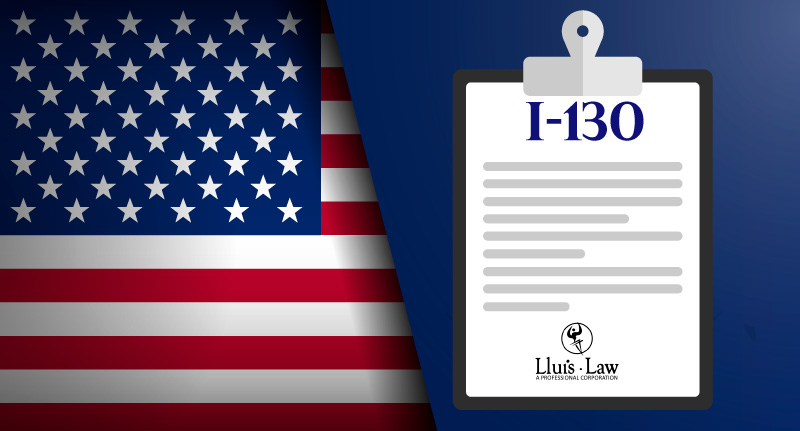
In our blog we explain how to fill out the I-130 form , in case you don’t know how to do it exactly.
Where To Send The Parole Request?
USCIS Dallas Postal Collections Box:
United States Postal Service (USPS) deliveries:
P.O.Box 660865
Dallas, TX 75266
FedEx, UPS and DHL deliveries:
2501 S. State Hwy. 121 Business
Lewisville, TX 75067
In the forms address book you have different addresses where to send many of the forms mentioned.
Request Parole For Minors
Let’s see what process must be followed for the parole of minors. To request the temporary stay permit for minors under 18 years of age, USCIS may require the following types of evidence:
How Long Does The Parole Process Last?
USCIS always tries to complete the process within 3 months. This however is highly variable depending on the complexity of the case and the initial supporting documentation.
On the request processing times page you can get the current processing times.
The important thing is to present all the initial supporting documentation and respond to requests about it to avoid delays.
Our lawyers can help you to know what the parole is and in this whole process to avoid delays.
Expedited Processing
To request expedited processing you must:
- Follow the criteria established in the instructions for Form I-131.
- Write the word “EXPEDITE” in black ink in the upper right corner of the application.
- Provide an E-mail, telephone number and fax number for the petitioner or representative with any expedited request.
- Normally requesting expedited processing is due to an urgent reason for which the applicant must demonstrate it. Examples of this would be life or death situations or any other situation of extreme urgency.
What To Do If My Temporary Stay Permit Is Denied?
You cannot appeal a denial of parole as it does not confer any substantive rights or immigration status.
In this case, you may submit a new Form I-131 packet with the fee or fee waiver request.
Note : There is no limit to the number of I-131 forms that one person can file.
Trips For The Parolees (Those Who Get The Parole)
The parole document issued to a person outside the US is valid for a single application for parole at the port of entry. If the petitioner leaves the US, her permission is cancelled.
If you want to travel abroad and return, you need an advance entry permit before traveling, known as an advanced parole.
Alternatively you can apply for a new parole from abroad or a valid return visa.
Request A Reissue Of A New Parole (Re-Parole)
In some cases a beneficiary may remain in the US beyond the authorized parole period. In these cases, they can reapply for the temporary stay permit from the US. The petitioner will do so in the following way:
- Filing a new Form I-131;
- By checking the box 1.e or 1.f in part 2 of the form and;
- By writing “re-parole” at the top of the application.
You must also include the required fees or fee waiver request along with evidence and materials to support the new parole request. This includes the explanation of the need for an additional parole period.
You must apply at least 90 days before the parole expires. This grants sufficient processing time and avoids accumulating time in illegal status.
Parole For Cubans
The Cuban Family Reunification Parole Program (CFRP) was created in 2007 and allows US citizens and Green Card holders (legal permanent residents) to request parole or permission to bring their Cuban family members.

What Is The Cuban Family Parole (CP3)
Within the Cuban Parole Program, it is contemplated that Cuban citizens over 21 years of age who hold a visa or who have been issued a parole (CP1), can request a family immigration parole. This program benefits certain family members.
On the other hand, the Special Program for Cuban Emigration, known as “el bombo”, is currently suspended.
Parole For Cuban Doctors In 2024
The program (Cuban Medical Professional Parole Program, CMPP) was repealed by the United States on January 12, 2017. However, applications made before that date continued to be processed and adjudicated by USCIS. Also in cases where a CMPP principal applicant, prior to that date, applied for permission to enter the US for their spouse and unmarried children under the age of 21, who will travel with them.
Similarly, Cuban medical professionals who were accepted into the CMPP Program, before or after January 12, 2017, could submit petitions for relatives to join them before August 24, 2017.
Initially, the program was created to help Cuban doctors and their families, who were sent by the Cuban government to work in other countries. The application for an entry permit to the US was presented at an American embassy or consulate.
Several US senators have petitioned the federal government to reinstate the program again. The sending of Cuban doctors and paramedics to work for the Cuban socialist government in other countries has been strongly questioned. Some Latin American governments and organizations have classified the Cuban program as a form of neo-slavery.

Did you know that you may be eligible to qualify under the Cuban Adjustment Act ? Learn more about this topic in our article.
What Is An Advance Parole?
The advance parole is an advance permission to enter. This document allows certain aliens to re-enter the US after traveling abroad without an immigrant or nonimmigrant visa.
It also allows foreigners who have applied for adjustment of status or some other benefit to keep the application while out of the country.
The Importance Of Having The Advance Parole Permit Before Traveling
Foreigners must have an advance parole permit before leaving the US As a general rule, if you did not obtain this permit before traveling, you will not be able to re-enter upon your return. Unless you have a valid visa.
The government may consider the alien to have abandoned their pending application for immigration benefits. When this occurs, the person would have to start the immigration process over again. To do this, you must resort to consular processing in your own country.
Have you ever wondered if you can change of status from a visitor visa to a Green Card ? In our blog we explain it in detail.
Who May Need Advance Parole?
This permit can be applied for by national foreigners in the US who wish to travel abroad but find themselves in the following situations:
- Admitted as refugees or have received asylum.
- Pending application for asylum in the United States .
- Pending adjustment of status application.
- They have received benefits under the family unity program.
- Obtained Temporary Protected Status (TPS) .
- They received a humanitarian parole or a T/U visa.
You can learn the T visa requirements and what is U visa in detail on our blog.
Who Is Not Eligible For Advance Parole?
Some aliens residing in the United States are not eligible to obtain this travel permit. This includes:
- National foreigners without valid immigration status.
- National foreigners with exchange visas, subject to the foreign residence requirement.
- Beneficiaries of a private bill.
- Holders of a valid re-entry permit unless returned to USCIS or shown to have been lost.
- Aliens in deportation proceedings, even if they are within the categories of TPS, T Visa or U Visa, asylum and so on with the exception of DACA beneficiaries .
For this last point, you can review our section dedicated to “ Immigration lawyers specialized in deportations ”.
Benefits Of Advance Parole
There are 2 main benefits:
- Allows the alien to return to the US after leaving the country without the need to obtain a visa.
- Keep the adjustment of status application pending with USCIS.
Before applying for advance parole, it is advisable to speak with an experienced immigration attorney. This will guide you on his eligibility.
Our attorneys have more than 40 years of combined experience with successful results in all areas of immigration. This includes helping immigrants understand how to become a US citizen even if they don’t know how to speak English .
Frequently Asked Questions About Advance Parole
Below we answer some of the frequently asked questions on the subject, including the definition of some terms in English.
What Is An I-512 Advance Parole?
It is the document issued by USCIS when it approves the travel permit. It can have two forms:
- The document properly known as I-512 or;
- The work permit card that the immigrant receives and also serves as advance parole. In fact, the document includes the phrase: “serves as I-512 advance parole”.
Who Can Travel Abroad And Return Without Having To Previously Obtain El Advance Parole?
The exceptions to travel outside the US and return without the need to present a travel document are for people who have the following types of visas:
- H-1B temporary workers , H-4 spouse, or the children of an H-1B.
- K-3 spouse or child (K-4) of a US citizen.
- L-1 workers who are transferred to US offices by the company, their spouse (L-2), or the child of the L-1 worker.
- Spouse (V-1) or children (V-2 / V-3) of a lawful permanent resident.
Upon returning to the US, holders of these visas must submit their respective nonimmigrant visas and have no limitations to remain admissible in the country.
As long as these people have an adjustment request pending, they will not be considered to have abandoned it. Even in cases where they did not apply for the advanced parole document before leaving the US.
We advise you to speak with our lawyers and have proof of the application for the adjustment of status application. In this case, Form I-797, which certifies receipt of the application, is useful.
Check our section for the types of American visas that interest you. There you will find a complete index with the main visas.
If I Am Or Have Been In The US Illegally, Can I Get Advance Parole?
Yes, you can. The problem is that a national foreigner who leaves the United States after being in the country illegally could be barred from re-entering. This includes cases in which the foreigner obtained the advance parole immigration document.
- When accumulating more than 180 days of unlawful presence, but less than one year, the law establishes a three-year restriction on reentry to the United States.
- If the illegal presence extends for more than one year, the re-entry ban can be for more than 10 years.
Before leaving the United States, aliens with a history of unlawful presence should consult an experienced attorney. The professional will be able to guide them about their situation to prevent them from making mistakes.

If, in addition to knowing what parole is, you are looking for a way to go live in the United States legally , then on our blog you will find an article focused on detailing this process.
If I Am Outside The United States, Can I Also Get Advance Parole?
Aliens who are already outside the US are generally not eligible for advance parole. However, for urgent humanitarian reasons or because of an important public benefit, a foreign national may be able to obtain advance parole.
Applicants for advance parole cannot use it to avoid delays or circumvent normal visa issuance procedures.
To process the advance parole, the foreigner outside the United States must submit their biometric data if they are between 14 and 79 years old. He must do so in the place where USCIS or the Department of State tells him to.
Does Advance Parole Guarantee That I Can Return To The US?
Definitely not. Even when the national foreigners obtain immigration parole, they are still subject to inspection by the Customs and Border Protection Service (CBP). This can occur at any US port of entry for the purpose of determining your admissibility into the country.
Aliens deemed inadmissible may be denied entry into the country. Also open an expedited removal process or be subject to a removal process before an immigration court.
How Long Does It Take To Process The Advance Parole?
Obtaining the advance parole document can take about 90 days. However, said granting could be expedited if you meet the requirements demanded by the United States Citizenship and Immigration Services (USCIS):
- An emergency.
- Serious financial loss to the company/individual.
- Humanitarian reasons.
- When it is a non-profit organization and travels abroad for cultural or social activities of interest to the United States.
- At the express request of the Department of Defense or any other agency for a matter of national interest.
- By USCIS error.
In this case, the processing of the expedited request may take up to 30 days. However, when it is an emergency request and depending on the case, the issuance of the document could be done the same day at the USCIS office.
How Long Can I Stay Outside Of The United States?
The validity of the immigration advance parole travel permit document to stay outside the country that is granted to foreigners, is generally 1 year, counted from the date of issue.
This does not mean that the Department of Homeland Security cannot, at any time, revoke or rescind the advance parole document. Regardless of whether the beneficiary is inside or outside the United States.
What Does “Serves As I-512 Advance Parole” Mean?
The phrase translates as an immigration document and refers to Form I-512, which is the actual permit granted by the US government to the immigrant.
What Is An Advance Parole Document?
It is the travel document (I-512 Advance parole) that authorizes the foreigner to re-enter the United States.
Now you know what an immigration parole is. We understand that it is a complex subject and doubts may come to your mind. For more information about the advance parole or any case related to immigration matters, call us.
The immigration lawyers at Lluis Law are at your disposal.
You Might Also Like

Voluntary departure

Immigration lawyers specializing in deportation

Marriage based Green Card Interview questions
What To Do if You Are Denied Entry Into the United States With Advance Parole
For green card applicants based in the United States and people with Deferred Action for Childhood Arrivals (DACA) status, Advance Parole is a welcome provision. With this travel document, you can leave the United States while in DACA status or while U.S. Citizenship and Immigration Services (USCIS) processes your green card application. Advance Parole provides a chance to visit ailing family, study abroad, attend forums and conferences abroad, and catch up with friends. But sometimes the U.S. government does not allow people with valid Advance Parole documents to reenter the United States. This article explains some reasons why the U.S. government would refuse to let you back into the country even with Advance Parole and some things you can do if you find yourself in this situation as an adjustment of status applicant or a DACA recipient.

Written by Jonathan Petts . Updated November 1, 2022
Why Was I Denied Entry Into the U.S. With Advance Parole?
U.S. Citizenship and Immigration Services (USCIS) can deny your entry into the United States with Advance Parole for multiple reasons. The Advance Parole application, known as Form I-131 , Application for Travel Document, does not guarantee your reentry. After you pay the filing fee and USCIS approves your application, your document will act as a reentry permit that gives you a pass to travel to a U.S. port of entry. You’ll need to get the physical document before you take your trip abroad. Be sure to check the processing times at your local USCIS office to make sure you can get approval before your travel date.
On your return, officers from U.S. Customs and Border Protection (CBP), a branch of the U.S. Department of Homeland Security (DHS), will decide if you can enter the country at the port of entry. Border patrol officers or CBP officers exercise discretion over whether you can return to the United States. Even if you have all the correct documentation, officers could still turn you away.
You could be denied reentry if USCIS denied your adjustment of status application while you were abroad on Advance Parole. Without a pending application, you lose your Advance Parole travel status since there is no longer a basis for your reentry. USCIS may have denied your application because you did not complete all the application steps while abroad. For example, you may have missed USCIS correspondence at your foreign address and did not act on their request for an interview or appointment .
What Can I Do if I Was Denied Entry Into the U.S. With Advance Parole?
If USCIS denies your entry into the United States with Advance Parole, you still have options to pursue. The options available to you depend on whether you got Advance Parole based on your immigrant visa application or on your DACA status.
Adjustment of Status Applicant With Advance Parole
If your Advance Parole ended because U.S. Citizenship and Immigration Services (USCIS) denied your adjustment of status application, you could apply for a new visa. You could get a tourist visa if you’re just visiting or you could even re-apply for a green card. You can re-apply for the green card as long as the reason USCIS denied your application is not because you don’t qualify for a green card .
For example, USCIS may have rejected your application because you didn’t provide enough supporting evidence or did not respond to requests for additional evidence they sent you. In that case, under immigration law, it is possible to apply again for the same immigration status. You may do so from your home country through your local U.S. embassy or by adjustment of status if you qualify.
DACA Recipient With Advance Parole
If you are a DACA recipient who gets stuck abroad, you may not be able to reenter the United States for some time. This is because you would have spent some time in the United States without lawful immigration status before getting DACA. This is called unlawful presence. For example, overstaying your visa as someone in nonimmigrant status would result in unlawful presence. There are consequences for this, depending on the length of your unlawful presence. You can face a three-year or 10-year bar from reentering the United States. USCIS can even permanently ban you from returning.
As a DACA recipient with Advance Parole, you will likely have to wait out your reentry bar if border patrol officials don’t allow you to enter the United States. You’ll be able to apply for a tourist visa to enter the country after you’ve waited out your reentry bar.
Talk to a Lawyer
Ultimately, the best thing you can do in any case is to talk to an immigration lawyer, especially one with experience with deportation cases and removal proceedings. If you face a reentry bar, they could help you file a waiver of inadmissibility for your unlawful presence. A waiver of inadmissibility is a pardon from the U.S. government for your unlawful presence. To file the waiver, you may have to justify your presence by providing humanitarian reasons or explaining how you provide a significant public benefit or other immigration benefit.
For example, you may have to prove a family member who is a U.S. citizen or lawful permanent resident will face extreme hardship and become dependent on the government if you have to wait out your reentry bar. If the U.S. government approves your waiver application, you can apply for a U.S. visa to enter the country once more.
Continue reading and learning!
Official websites use .gov A .gov website belongs to an official government organization in the United States.
Secure .gov websites use HTTPS A lock ( A locked padlock ) or https:// means you've safely connected to the .gov website. Share sensitive information only on official, secure websites.
- Create Account
Hearing on “Examining CBP One: Functions, Features, Expansion, and Risks” before the Committee on Homeland Security Subcommittee on Border Security and Enforcement on March 21, 2024
WRITTEN TESTIMONY of TAMMY MECKLEY ASSOCIATE DIRECTOR IMMIGRATION RECORDS AND IDENTITY SERVICES U.S. CITIZENSHIP AND IMMIGRATION SERVICES FOR A HEARING ON BEFORE Committee on Homeland Security Subcommittee on Border Security and Enforcement ON “Examining CBP One: Functions, Features, Expansion, and Risks” March 21, 2024 2:00pm Washington, DC
Chairman Higgins, Chairman Bishop, Ranking Member Correa, Ranking Member Ivey, and distinguished Members of the Subcommittees:
Thank you for the opportunity to speak with you today about the operational execution of some of the processes U.S. Citizenship and Immigration Services (USCIS) helps administer. USCIS is the government agency that oversees lawful immigration to the United States, and I am proud to serve with the over 20,000 government employees and contractors that work at more than 200 USCIS offices across the country and the world to accomplish this mission.
USCIS remains steadfast in its commitment to ensuring a fair, orderly, and humane immigration system, consistent with U.S. law and international obligations. As part of our mission, USCIS helps administer parole processes for Ukrainians, Cubans, Haitians, Nicaraguans, and Venezuelans and their immediate family members. These processes support the U.S. Department of Homeland Security’s (DHS) broader strategy to disincentivize irregular migration by simultaneously expanding the availability of safe, orderly, and lawful processes to come to the United States, and strictly enforcing our nation’s immigration laws by imposing consequences on individuals who do not avail themselves of these lawful pathways.
I am here today to explain USCIS’s role in the execution of these parole processes.
Building on the success of the Uniting for Ukraine parole process, DHS established the parole process for Venezuelans in October 2022 and the parole processes for Cubans, Haitians, and Nicaraguans in January 2023. Through these processes, certain nationals of Cuba, Haiti, Nicaragua, and Venezuela (CHNV) and their immediate family members may request to come to the United States in a safe and orderly way. The processes are capped at 30,000 parolees per month across the four nationalities. Eligible beneficiaries, who are outside the United States, may be considered by U.S. Customs and Border Protection (CBP), on a case-by-case basis for urgent humanitarian reasons or significant public benefit, for advance authorization to travel and a temporary period of parole for up to two years. To participate, eligible beneficiaries must:
- Have a confirmed supporter in the United States who must first complete a process with USCIS;
- Undergo and clear robust security vetting;
- Meet other eligibility criteria; and
- Warrant a favorable exercise of discretion.
Parole Supporter Definition and Requirements
USCIS’s role in the CHNV processes is to assess whether a potential supporter in the United States who commits to providing financial and other support for the beneficiary by filing Form I-134A, Online Request to be a Supporter and Declaration of Financial Support, meets established requirements. The supporter is the individual who pledges to provide financial support to the beneficiary for the duration of the parole authorization period.
To serve as a supporter in this process, an individual or an individual representing an entity must:
- Be a U.S. citizen, national, or lawful permanent resident; hold a lawful status in the United States, such as Temporary Protected Status or asylum; or be a parolee or recipient of deferred action or Deferred Enforced Departure;
- Pass security and background vetting, including for public safety, national security, human trafficking, and exploitation concerns; and
- Demonstrate sufficient financial resources to receive, maintain, and support the individual(s) they are agreeing to support for the duration of their parole period.
The supporter is required to submit a Form I-134A for each individual they wish to support and demonstrate the adequacy of financial resources to support that individual during their stay in the United States. Financial support may be offered by organizations, businesses, or other entities, however, the I-134A must be filed by an individual. In those instances, USCIS reviewers may accept a letter of commitment from the organization and consider its financial resources.
Sufficient Financial Evidence
The potential supporter must show evidence of sufficient financial resources to qualify as a supporter for purposes of the CHNV parole processes. USCIS uses the Federal Poverty Guidelines as a general guide to assess financial sufficiency.
Potential supporters who file Form I-134A on behalf of a beneficiary under these processes must be willing and able to receive, maintain, and support the listed beneficiary for the duration of their parole, and articulate how they will do so.
Examples of evidence to show sufficient financial resources can include tax documents, bank statements, and pay stubs. Potential supporters are also required to describe in detail their plan for providing essential support to beneficiaries, such as basic living needs, appropriate housing, and access to available services and benefits, such as learning English, securing employment, and enrolling in school.
Security Screening
USCIS employs a multi-faceted approach to screening and vetting potential supporters. At filing, system checks are initiated automatically on supporters for all submissions. These checks will automatically flag cases with matching records (or “hits”). USCIS officers determine whether the hit relates to the potential supporter. If the hit relates to the potential supporter, the USCIS officer will determine whether the hit impacts the potential supporter’s eligibility for these processes. For example:
- The potential supporter is subject to an order of protection.
- Egregious Public Safety [1] ;
- Adam Walsh Act violations;
- Domestic violence;
- Sexual assault; or
- Immigration fraud [2] .
- The potential supporter poses a potential national security, public safety, or trafficking concern, as indicated by the hit.
- Any association with crimes involving children (child exploitation, child sex abuse, child abuse, etc.) or trafficking in persons.
USCIS also uses a wide range of risk-based modeling and biographic searches to initiate referrals to its Fraud Detection and National Security (FDNS) Directorate for additional screening of potential supporters, and even site visits or administrative investigation where appropriate. This can occur at all stages of the process and is based on continuously reassessed risk factors and on direct referrals from reviewers, tips, or biographic data scrapes.
Once the potential supporter has filed the Form I-134A and it is confirmed by USCIS, the beneficiary receives emailed instructions for creating a USCIS online account and linking their case. In the online account, the beneficiary reviews and confirms their biographic information and completes necessary attestations (including attestations for eligibility and vaccines) for themselves and, if applicable, immediate family members. Once this information has been submitted, CBP determines whether to issue an advance travel authorization to the beneficiary and makes a case-by-case parole determination at the port-of-entry.
Thank you again for the opportunity to explain our role, and I would be happy to answer any questions. Benefit Fraud and Public Safety Cases. This includes murder, sexual abuse of a minor, and illicit trafficking of controlled substances or trafficking of persons but this is not exhaustive.
[1] An Egregious Public Safety case is defined by USCIS and U.S. Immigration and Customs Enforcement (ICE) in the 2020 Memorandum of Agreement (MOA) Between USCIS and ICE Regarding the Referral of Immigration [2] Immigration fraud is defined by USCIS in the Policy Manual under Chapter 2 – Overview of Fraud and Willful Misrepresentation.

IMAGES
VIDEO
COMMENTS
Advance Parole travel is always a risky choice. Advance Parole permits you to approach a U.S. port of entry to request parole. But Advance Parole does not guarantee re-entry, even with the correct documentation. U.S. Customs and Border Protection (CBP) could prevent any non-U.S. citizen or lawful permanent resident from re-entering.
Traveling with Advance Parole (My Experience) I-131 (Travel) I wanted to share my experience about traveling with an advance parole. Background info: Pending AOS (marriage based) with PD of Oct 19, 2021. Received the AP on Oct 3, 2022 (Not a combo card, EAD approved earlier on March 3, 2022.) Traveled to my home country with my spouse to visit ...
To apply for a passport, U.S. citizens can visit State Department website or call the U.S. Passport Office at 1-877-4USA-PPT or TDD/TYY: 1-888-874-7793. Foreign residents should contact their respective governments to obtain passports. Due to recent changes to U.S. immigration law, travel outside of the United States may have severe ...
Mitigating the Risks. Taking the following steps can help mitigate the risks associated with travel during the immigration application process: Obtain Advance Parole before planning any trips outside the United States. Wait for the I-485 receipt notice that confirms your application is being processed. Check the expiration date of your Advance ...
Not being able to return. Advance Parole approval does not guarantee that you will be allowed to re-enter the United States. Individuals must be "admissible" in order to re-enter the U.S. after a trip abroad. Admissibility is a term that is defined within U.S. immigration law and refers to a non-citizen entry by inspection into the United ...
Step #2 Apply for Advance Parole. Write a cover letter: Explaining the purpose of travel and summarizing the documents included in your application ( see example) Fill out the advance parole application: USCIS Form I-131 (Read the instructions carefully!) Currently, you must file a paper application and cannot apply for advance parole through ...
Advance parole is a way for people in the United States with Deferred Action for Childhood Arrivals (DACA) to request advanced permission to travel abroad. Advance parole requests are reviewed and granted by U.S. Citizenship and Immigration Services (USCIS). Although getting a grant of advance parole is the first crucial step, it does not ...
If you leave without Advance Parole, you will likely be denied reentry and your DACA approval will be cancelled. However, being approved for Advance Parole does not guarantee your safe return either. First off, if you push things until the last minute and plan to return just before your Advance Parole document expired, then encounter travel ...
Prepared and signed Form I-131, Application for Travel Document. Copy of a photo identity document (with photo, name and date of birth) such as an Employment Authorization Card (work permit) or driver's license. Proof that you have been approved for DACA (Form I-797) Two identical passport-style color photographs.
o USIS will only approve travel ("advance parole") for AA recipients who demonstrate that their need for travel is for "humanitarian, education, or employment" purposes.* Humanitarian: For example: travel to obtain medical treatment, attend funeral services for a family member, or visit a sick or elderly relative. Educational:
An advance parole travel document is not a guarantee for re-entry to the United States. You are still subject to the standard immigration inspection at a port of entry to determine admissibility into the U.S. If you have any period of unlawful presence in the U.S., consult with an attorney before filing Form I-131 or traveling abroad. ...
30 Second Recap: Traveling with Advance Parole on DACA offers benefits such as visiting family, studying abroad, or attending work events, but it also carries risks. Changes in immigration policies or individual circumstances can impact re-entry, even with Advance Parole. To mitigate risks, DACA recipients should consult with an attorney ...
Travel on Advance Parole: FAQs. Applicants for adjustment of status with a pending I-485 application are eligible to receive an Advance Parole travel document, which enables them to travel internationally without the need of an underlying visa while they wait for their green card to be approved. If you have received Advance Parole on the basis ...
The validity of the immigration advance parole travel permit document to stay outside the country that is granted to foreigners, is generally 1 year, counted from the date of issue. This does not mean that the Department of Homeland Security cannot, at any time, revoke or rescind the advance parole document. Regardless of whether the ...
A transportation company (airlines) can accept an advance parole document instead of a visa as proof that you are authorized to travel to the United States. An advance parole document does not replace your passport. Please note that having an advance parole document does not guarantee that you will be allowed to reenter the United States.
Advance parole is a special permission granted by USCIS, in the form of a travel document, to be able to temporarily travel overseas while living in the United States and awaiting your green card or while on another noncitizen immigration status. If you travel outside of the United States while your green card application is pending, it will be ...
For green card applicants based in the United States and people with Deferred Action for Childhood Arrivals (DACA) status, Advance Parole is a welcome provision. With this travel document, you can leave the United States while in DACA status or while U.S. Citizenship and Immigration Services (USCIS) processes your green card application. Advance Parole provides a chance to visit ailing family ...
30 Second Recap: DACA recipients can travel internationally only with Advance Parole, which is granted for humanitarian, educational, or employment purposes. Travel without Advance Parole can result in losing DACA status and facing re-entry bars. Domestic travel within the U.S. is generally less problematic, but proper identification is necessary.
Serves as a visa replacement. It provides a path to re entry but does not guarantee re-entry even if you have the correct documents. US customs and border protection controls your entry not your advance parole status. If there is no emergency, if I were you, I would stay and wait for the process to be completed. 2.
Yeah but unfortunately, once the green card is issued the advanced parole is no longer valid. If you want to be safe get an ADIT stamp on your passport prior to leaving the country. Speaking from experience in this one. 1. Award. I'm in the middle of my AOS and am planning on traveling home. I have applied for I512 advance parole and received ...
I need to go to France for work, it will be a 10 days trip. My lawyers warned me that the I-512 advance parole is necessary to travel but that it also doesn't guarantee I will be allowed back in the country, that the immigration officer will have full power to admit me or not. I will have a letter from my lawyers, a letter from my employer.
Once this information has been submitted, CBP determines whether to issue an advance travel authorization to the beneficiary and makes a case-by-case parole determination at the port-of-entry. Conclusion. Thank you again for the opportunity to explain our role, and I would be happy to answer any questions. Benefit Fraud and Public Safety Cases.
Is it safe to travel on an I-512 advance parole these days or has anyone had experience recently? I have a combo card - EAD which also serves as advance parole and have a flight on Monday abroad. I'm just freaking out a bit about re-entry into the US so any advice would be helpful. Thank you!
The second issue is if for whatever reason your case is denied while you are using your AP, you will be deported on your return. Lawyers use this as a way to mitigate risk. But if you are careful and have no reason to be worried about your case being denied, i think use it without worry just be careful with your piece of paper!! 1.